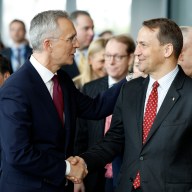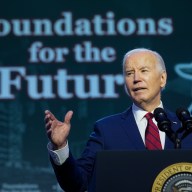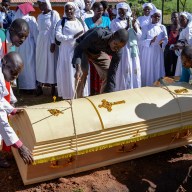BAGHDAD – The self-described leader of an al-Qaida front group issued a new audio tape this weekend, deepening the mystery surrounding the identity of the insurgent leader whom the Iraqi government claims to have in custody and whose very existence the U.S. once questioned.
The man purporting to be Abu Omar al-Baghdadi, the head of the Islamic State of Iraq, issued the usual litany of militant rhetoric against the West in the 40-minute tape that was posted Saturday on militant websites.
He criticized Pope Benedict recent trip to the Middle East, including Israel, condemned the Pakistani army’s offensive against the Taliban and called President Barack Obama “a black slave and Muslim renegade.”
The speaker also said the Iraqi government’s claim that it had captured him was “a pure lie,” adding the detainee who has confessed to being him was an impostor.
“The primary goal of their lie is to pressure us to physically appear in a visual production,” he said. “It is a stupid trick.”
The audio could not be independently confirmed, but the U.S.-based site Intelligence Group that monitors such websites said the voice seemed like that of the person previously identified as al-Baghdadi.
It was the latest development in the drama surrounding the Iraqi government’s April 23 announcement that they had arrested al-Baghdadi.
The issue has implications for the professionalism of the Iraqi security forces, which handled the arrest without U.S. assistance, as well as for the Sunni insurgency.
Past Iraqi claims to have captured or killed al-Baghdadi turned out to be wrong, and the Islamic State of Iraq has issued at least two other denials of al-Baghdadi’s capture.
The U.S. military has not confirmed the suspect’s identity. But the government has been insistent that this time it has its man.
“We have no doubt that the person in our custody is the real Abu Omar al-Baghdadi,” said Firyad Rawndouzi, a member of the parliament’s security and defence committee. “Al-Qaida leaders want to raise the morale of their followers by alleging that al-Baghdadi is still free and the Iraqi government is lying about this.”
Iraqi military officials proudly displayed a photo of a man with a close-cropped beard and black T-shirt in describing his capture as a major setback for Sunni insurgents trying to intensify attacks after a relative lull.
Iraqi television later aired partial footage of the interrogation of the suspect, who confessed and said his real name was Ahmed Abed Ahmed Khamees al-Mujamaie, born in 1969 in Diyala province north of Baghdad. He said al-Qaida in Iraq relied for funding on money sent by charities in Egypt, Saudi Arabia and Syria as well as from robberies carried out inside Iraq.
The Islamic State has never released a picture of the man it claims is al-Baghdadi, which is a codename. Al-Mujamaie’s wife has publicly denied that her husband is al-Baghdadi and is trying to hire a lawyer to help in his defence.
Bruce Hoffman, a terrorism expert at Georgetown University, said the continued inability to definitively prove al-Baghdadi’s identity could give the insurgency a boost by undermining public confidence in the government as the U.S. military begins to withdraw.
“It’s remarkable that even with this person in custody there’s still not any more clarity on whether this person even exists,” he said. “This difficulty in publicly resolving his identity potentially strengthens the insurgency, especially if he turns out not to be the person they claim he is.”
The capture or death of other high-ranking insurgent figures in the past – including former al-Qaida in Iraq leader Abu Musab al-Zarqawi in 2006 – has done little to slow the bombings.
Nearly 200 people alone have been killed in blasts in the Iraqi capital since al-Baghdadi was purportedly caught.
“Even if Baghdadi’s arrest is true, this case illustrates the difficulties in combating the jihadist threat merely by targeting top leaders,” said site director Rita Katz.
U.S. officials, faced with the potentially embarrassing possibility of being seen as contradicting the Iraqi government, played down the significance of identity in an organization that has proven resilient in the face of setbacks.
The U.S. military has said in the past that al-Baghdadi was a fictitious character used to give an Iraqi face to an organization dominated by foreign al-Qaida fighters. But al-Qaida leader Osama bin Laden vouched for al-Baghdadi in a 2007 audio tape in which he said “Emir Abu Omar would rather have his neck severed than betray the Muslims.”
Even if al-Baghdadi does exist, it was unclear what his role is in the terror group – whether he really runs it or whether he’s a figurehead.
“What we are doing is trying to determine – regardless of what his name is – what role did he play in the network,” Maj.-Gen. David Perkins said at a news conference earlier this month. “Is somebody else going to take his place? We find routinely in these networked organizations that when you remove somebody, somebody else gets moved in.”
















